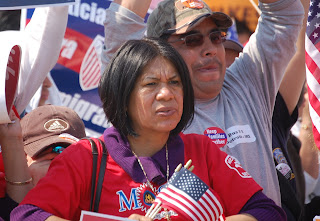
The Obama administration is sending subtle but unmistakable signals to the Arroyo administration that it is closely watching how it is conducting elections in the Philippines.
After President Arroyo finally got her wish for a face-to-face meeting with President Obama last July, US officials quickly let it be known that the White House was expecting the May 2010 elections to push through. There was much speculation at the time that Mrs. Arroyo was promoting charter change to amend Constitutional term limits.
This week, the Millennium Challenge Corporation (MCC) announced it was delaying approval of over $430 million in grants until after the results of the Philippine polls. The MCC is headed by State Secretary Hillary Clinton.
Mrs. Clinton had met with a contingent of Fil-Am community leaders headed by New York businesswoman Loida Nicolas Lewis on March 10.
Ms. Lewis sought Mrs. Clinton's help to convince President Obama to send a top-level observer team for the Philippine elections, similar to what the US did in the 1986 "snap elections" that pitted strongman President Ferdinand Marcos against a widow, Corazon Aquino.
Ms. Lewis is a longtime supporter of Mrs. Clinton, dating back to the time when she was First Lady and later as New York Senator. Ms. Lewis is now also a supporter of Liberal Party standard bearer Benigno "Noynoy" Aquino III.
But Ms. Lewis says that in wielding her clout with the US Secretary of State, she was more concerned with the possible failure of elections, that could pave the way for President Arroyo to prolong her hold on power.
There is a deep, consuming distrust of President Arroyo in key sectors of the Fil-Am community. And by publicly airing their concerns, they are pushing the US to take a second look at their presently positive assessment of the coming polls.
The meeting with Secretary Clinton lasted only a few minutes -- barely enough for a photo-op but more than ample for sharing worried words. "We will look into this," Mrs. Clinton assured the Fil-Am leaders repeatedly.
For over an hour, the group briefed Jake Sullivan, Secretary Clinton’s deputy chief of staff for policy and a recent Manila visitor.
He told them during the meeting that the reports they’re getting “is not as pessimistic” as what the group was telling him.
Sullivan signaled the US can not afford to discount any scenario because an electoral debacle and the possibility of unrest in the Philippines “will be felt in neighboring countries, the region and certainly, in the United States”.
The Philippines is a lynchpin of US engagement in Asia. She is one of four US treaty allies in the Pacific – Japan, South Korea and Thailand being the others.
“Our alliances remain the bedrock of our engagement in the region, and the Obama administration is committed to strengthening and modernizing our alliances to address both continuing and emerging challenges,” Assistant State Secretary for East Asian and Pacific Affairs Kurt Campbell told a House foreign affairs panel earlier this month.
The Fil-Ams' visit to the State Department came in the eve of findings of the National Democratic Institute, which substantially backed up their assertions the Commission on Elections (Comelec) needed to do more to safeguard the country's first-ever computerized elections.
Trying something new almost always brings a certain amount of anxiety. But for some Fil-Ams that uncertainty is being fanned by a belief, right or wrong, that President Arroyo is trying to find a way to hang on to power.
And Mrs. Arroyo -- for reasons only she can know -- is giving little reason for them to think otherwise. In December 2003, she declared in Baguio City that she was not running in the following year's elections; her "victory" was marred by widespread accusations of electoral fraud. She was largely seen as prodding loyal lawmakers to work for charter change to circumvent term limits until a broad opposition -- including from the US -- forced them to relent. Malacanang is widely perceived as the prime mover behind filling the Supreme Court Chief Justice post even before it becomes vacant. And at a time when people are airing fears of a military take-over, President Arroyo appoints her former Palace centurion, Lt. Gen. Delfin Bangit to lead the Philippine military.
But one Alexandria, Virginia Fil-Am business executive predicts Filipino voters will see through this, and doubts Mrs. Arroyo has the absolute loyalty of all 120,000 soldiers in the Armed Forces of the Philippines.
President Arroyo is scheduled to fly into town again early next month to attend a nuclear security summit organized by President Obama. Philippine officials may be lobbying the White House for a "pull-aside photo-op" during the summit at DC's Convention Center, but insiders tell me no separate one-on-one meeting is planned.
This visit was supposed to be Mrs. Arroyo's "victory lap" because they had expected the MCC to approve the Philippine Compact proposal this week.
Instead, the Philippine leader, derided at home, will have to look for other "victories" to tout in her visit to Washington DC.




















































